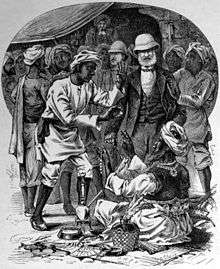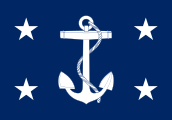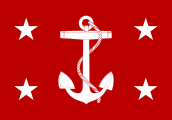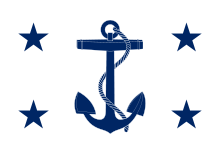Adolph E. Borie
| Adolph Edward Borie | |
|---|---|
 | |
| 25th United States Secretary of the Navy | |
|
In office March 9, 1869 – June 25, 1869 | |
| President | Ulysses S. Grant |
| Preceded by | Gideon Welles |
| Succeeded by | George M. Robeson |
| Personal details | |
| Born |
November 25, 1809 Philadelphia, Pennsylvania, US |
| Died |
February 5, 1880 (aged 70) Philadelphia, Pennsylvania, US |
| Political party | Republican |
| Alma mater | University of Pennsylvania |
| Profession | Politician |
Adolph Edward Borie (November 25, 1809 – February 5, 1880) was a United States merchant and politician who briefly served (1869) as Secretary of the Navy in the Ulysses S. Grant administration. A native of Philadelphia Borie was born into a successful merchantile trade business of his father. After graduating from the University of Pennsylvania, Borie traveled abroad in 1825, returning to the United States in 1828 to enter his father's merchantile firm, his career lasting the next thirty years. As a Whig Party supporter Borie favored tariffs to protect his world wide business interests. Joining the Republican Party, Borie supported Abraham Lincoln for President. When the Civil War broke out Borie supported the Union war effort and became a close associate to General Ulysses S. Grant. When Grant was elected President in 1868, he appointed Borie to Secretary of Navy on March 5, 1869 one day after his Inauguration. Borie served only a few months in office before quietly retiring, claiming that the job was to demanding and that he was in frail health. During his brief tenor Borie controversially renamed many naval ships and he allowed Vice Admiral David Porter to de facto run the Navy Department. After his retirement Borie returned to his business interests. He remained close friends with Grant and accompanied Grant on his famous world tour starting in 1877 and returning to the United States in 1879. In poor health after his travels Borie died on February 5, 1880.
Early life, education, and career
Borie was born in Philadelphia on November 25, 1809 the eldest of 12 children.[1] He was the son of a French emigrant John Joseph Borie, a merchant and manufacturer, who settled in Philadelphia.[1] His mother was Sophia Beauveau a Haitian refugee.[1] He attended the University of Pennsylvania, graduated in 1825, toured Europe, and in 1828 entered his father's merchantile firm.[1] Silk and tea were the emphasized trade commodities during his 30-year tenure in the firm during the epoch of the clipperships. [1] Borie's firm did trade business with Mexico, the West Indies, and the Far East when Philadephia foreign trade was at it zenith.[1] Borie was a pioneer in lobbying the federal government for diplomatic and naval support in protecting his business abroad. [1] The magnitude of his business was enormous, identified by $100,000 in property damages incurred during the 1857-58 disturbances of the Second Opium War in China. [1] From 1848 to 1860 Borie was President of The Bank of Commerce, and he became the director of several leading business ventures in Philadelphia. [1]
Marriage
On May 23, 1839 Borie married Elizabeth Dundas McKean. [1] Elizabeth was descended from David I, King of Scotland. The couple had no children.
Whig politics
Prior to the Civil War, Borie had a slight connection to politics. He championed Whig Party policies and favored protectionist international trade.[1] In 1843, Borie was consul to Belgium. [1] When the Whig Party demised in the mid 1850's Borie became a Republican.[1]
Civil War
In 1860, Borie supported Republican candidate Abraham Lincoln during the presidential election of 1860.[1] At the outbreak of the Civil War Borie ardently supported the Union cause and Lincoln's presidency.[1] He was a founding member and one-time vice-president of Philadelphia's Union League, and guided the recruiting and equipping of several regiments, inspiring Unionist sentiment.[1] The Philadelphia Union League assumed national importance and inspired other cities to create similar organizations supporting the Union War effort against the Confederacy. [1] During the war Borie became an intimate associate with Union General Ulysses S. Grant. [1]
Secretary of Navy 1869
.tif.jpg)
On March 5, 1869 President Ulysses S. Grant nominated Borie Secretary of the Navy. Grant, in his choices for various posts, desired to choose non elected people for office, or simply because they were personal friends. For his first cabinet, Grant did not seek advice from Senators in his selections, partly out of national unity, and partly out of his military training to choose cabinet members as subordinates. A few of his nominees were exceptional in their service, most notably his effective Secretary of State Hamilton Fish, Secretary of the Treasury Benjamin Bristow, and Attorney General Alphonso Taft. But, in his initial stages of choosing his 1869 cabinet, it was a hit-or-miss matter. Borie had been very friendly to Grant on a visit to Philadelphia that he chaired. Grant, considering that he owed something to Borie and to the Republicans in the Keystone State announced that there would be a man from Pennsylvania in his cabinet. When pressed for details ("was it a member of the Republican machine under Simon Cameron?") Grant's sense of humor took over and he became mysterious, talking about a "man from Philadelphia".
The question of who was this "man from Philadelphia" bothered the public, but the revelation it was Borie was met with amazement. Nobody had ever heard of him outside of Philadelphia. Borie had little interest in public office, and freely admitted that Admiral David Dixon Porter was the actual manager.
Renaming ships controversy
Borie disliked the Native American Indian names borne by so many United States Navy ships of the post-American Civil War era, and during his very short term as Secretary of the Navy, had a great many vessels renamed after states of the Union, creatures and personages from classical Greek or Roman mythology, or names that conveyed power or strength. A sample of names that Borie selected were Florida, "Centaur", and "Tornado". The general public was shocked on hearing the changes, because it was traditional for American ships to be given American names. His successor, George M. Robeson, had most of these ships reverted to their original names a few months later. Ironically, Borie was a Philadelphian associated with the town of Manayunk (now a Philadelphia neighborhood), and one of the vessels that was never given back its original name was USS Manayunk, which permanently kept its new name of USS Ajax. Borie served only a few months (March 9 to June 25) in the position. His retirement was held secret from the public, but was primarily due to he wanted to return to his business and that the job was overall too demanding for him.
Enforced full pay and eight hour work day
On May 29, 1869 Borie enforced full pay and the eight hour work day at the Brooklyn Navy Yard for mechanics and laborers for work per diem. Workers would receive unpaid backpay dating from May 19. Borie gave specific instructions:
- 1. Workers were to arrive at precisely 7:45 AM
- 2. Workers were to start work at 8:00 AM and work until 12:00 PM
- 3. Workers were to take a one hour lunch break from 12:00 PM to 1:00 PM
- 4. Workers were resume work starting at 1:00 PM and ending at 5:00 PM
The preciseness of the working times upset the workers. [2]
Desegregated Washington Navy Yard
In June 1869, Borie desegregated the Washington Navy Yard allowing African American males to enter and work in the facilities. Borie was personally thanked by the Working Women's Association on June 17. [3]
Resignation
On June 25, 1869 Borie quietly resigned office unknown to the general public. There was no formal explanation given other then that he was in frail health, the Navy Department was stressful to manage, and he desired to return to his business interests. When it was announced that George M. Robeson had been nominated and replaced Borie, the public was shocked, not knowing that Borie had even resigned. Also Robeson was not known outside of New Jersey, his home state. Again, Grant did not seek Senate advise when finding an experienced candidate to run the Navy Department. Borie returned to his home in Philadelphia.
Later career and travels
Borie returned to private life and resumed his business interests. In his later business career, he interested himself in railroads and financial concerns. He was a noted patron of the arts. He remained close friends with Grant, who he joined for much of his world tour in 1879-1879.
Death
The demands of traveling abroad took a toll on Borie's health. Having returned to Philidelphia he died on February 5, 1880.
Historical reputation
For his brief service, two ships were christened USS Borie in Borie's honor.
References
Sources
- Bowden, Witt (1929). Allen Johnson, ed. Dictionary of American Biography Borie, Adolph Edward. New York: Charles Scribner's Sons. p. 464.
- Claude Bowers The Tragic Era: The Revolution After Lincoln (New York: Halcyon Press, 1929), p. 238-239.
New York Times
- "Labor Movements Workingwoman's Association". New York Times. New York. June 18, 1869.
- "The Eight-Hour Law in the Brooklyn Navy-Yard". New York Times. New York. May 30, 1869.
External links
- The Borie Family Papers, including personal and professional correspondence, business records, and various other materials, are available for research use at the Historical Society of Pennsylvania.
| Government offices | ||
|---|---|---|
| Preceded by Gideon Welles |
United States Secretary of the Navy 1869 |
Succeeded by George M. Robeson |



